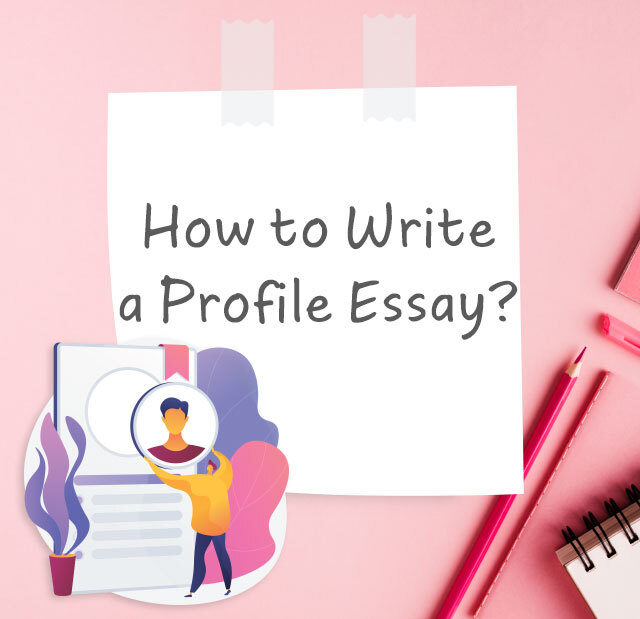What Is a Profile Essay?
A profile essay can be considered a literary piece of writing, in which the writer mainly delivers a descriptive account of a person, place, or event. The goal of the profile essay is to be informative. It usually conforms to standards found in journalism – that is to say, using facts and offering impartial reportage – while conveying this information in a literary style.

Literary style means offering more to the reader than a revised press release or stenographed interview. Offer insight and immersion to the reader, show them the layers of character and environment, and run these underlying factual happenings through your individual interpretation of it all.
The Purpose of Profile Essays
The purpose of a profile essay is to be read and well-received by an audience. It is not an obscure technical writing piece, although it may cover obscure figures or events. In general, profile essays appear in magazines and newspapers – in either their print or digital formats. They also appear in scholarly or trade journals, usually covering rising or established people within these niches.
For the writer, a profile essay is a piece of writing aimed at joining the journalistic and literary style. As mentioned in the previous section, journalistic writing must be factual and rigorously checked for errors. Literary writing has some joy involved in its reading; in what way that joy comes out in ‘writing style’ is up to you.
Ultimately, with those two concepts in mind, the purpose of a profile essay is to get you, the writer, some more work. Profiles are highly prevalent and serve as a fantastic way of adding more pieces to your portfolio, whether you’re a new essay writer or a seasoned pro.
Prepare for your essay
Preparing for a profile depends on how close you are to starting writing. Writers coming to this article with a stretch of time ahead of them have the luxury of doing some background reading that is not directly related to the matter at hand. Finding a good profile essay example has the hidden benefit of looking like a lazy weekend afternoon; get a stack of magazines and read.
Some of the most common places to find quality profiles are The New Yorker, The New York Review of Books, the London Review of Books, Esquire, or National Geographic. Another perspective is to look for writers, head to your bookshelf or local book store, and do some digging. Again, read and make some notes on the qualities you enjoy and dislike in a range of profiles.
Lastly, in terms of reading, examine the differences between an essay or article profiling a person and one that profiles an event.
That form of preparation is more akin to education. It is needed to bolster your understanding of the broad picture and what is essentially the marketplace for your piece of work.
Preparing for your actual essay, not the skill of writing an ambiguous profile essay, is another matter. The research and reading that are highly relevant to your subject matter will make or break your profile essay.
To begin with, you must find all profiles of your subject that are in existence and don’t require a transatlantic flight to a dusty library archive – in this instance, simply email the library and ask if they’ve considered digitizing their collection, starting with your desired piece.
One of the most surefire organization tactics for research is timelining. Start at the beginning; be sure to go into ‘negative digits’ and look at the parent’s history or the town’s history, or anything else that emerges in your research.
After ‘time’ as a category of thinking comes ‘significance.’ What were the defining features of this person’s life, and to what sort of ‘movement’ might they belong? Add this into your timeline research and press on.
Have you selected a person or place that is feasible to contact and ask for a quote or interview? You may also want to reach out to other players in the story you’re telling and see what they have to say on things.
Preparing all this research can get messy and cluttered. The best way to solve this problem is to follow a system from the start, as mentioned above; time is a great organizer. Also, keep a running bibliography in a separate file on your computer. Keep tabs on everything you’ve read, and be as forensic as possible with maintaining records. Who knows what might happen in the future regarding the focus of your essay? They might run for president, or they might fade into obscurity.
Profile Essay Outline
As a profile essay combines qualities of journalism and literary writing, the ideal outline doesn’t exist. Literary writing can take the reader on a journey; in fact, the only requirement of the structure is to guide this journey as magnificently as possible.
Were we to suggest a general profile essay outline, it would contain these sections and ingredients. The order is flexible to an extent. It depends on the content of your profile. Have you got an interview to draw upon, or are you using your storytelling powers to deduct and infer from other sources?
In your introduction, if you’ve conducted an interview, use a quote for your lede. A good quote is an excellent way to set the tone and give an impression of your subject to the reader. Those without an interview might consider a bold statement; be sure that you use something here to act as a powerful lede and bring the reader on board.
Alluring mysteries are one thing; though the crunch point for this gambit is to make the pay-off worthwhile. Else, the cliff-edge and the tension you create will be for nothing in the end.
There will be time to provide things like background and biography in the main body of a profile essay. These tend to follow the lede as they’re a nice cool-down; they give the reader a chance to build knowledge on an obscure topic. Whereas for the writer, both the background and biography offer an opportunity to peg in some facts, figures, and breadcrumbs to draw upon later.
The body of a profile essay is tricky. You, first of all, need to engagingly tell your readers the story in it. Remember to build tension and really ‘let go’ when it comes to releasing that tension. Tell it to a friend, read it aloud. Move around the paragraphs. Remember that the profile is following an arc and in your conclusions, hook back in the initial qualities of the opening part. This technique is like cadence in music, and it will please your audience as long as it isn’t too trite.
Profile Essay Topics
A suitable subject or topic depends on your qualities as a writer and the desired outcome of writing such a profile essay. Now, it does not have to include an interview, but many profile essays do include them. Some profile essay topics may be inanimate objects or complex emergences of human life (events). If this is the case, you can still interview
For interviews, considering you’re likely a lowly reporter on a college paper, getting an interview with a high-flying sportsperson, politician, or musician is unlikely. In any event, the lower-flying specimens of these species could make a good target.
The most important thing to consider when choosing the topic or subject is to work with your gut and instinct. If you’re interested in the story, you’re going to have much more to put into it, and your excitement and verve will show through in writing. It may also make it easier to stomach the long hours of tedious research that can emerge when trying to prove or disprove an obscurity of some kind.
If you haven’t decided on the topic, there’s still room for maneuver. You can look at the subject matter and present your perspective on the case; that’s the subjective element of a profile, your view.
This perspective of yours can focus on just one specific aspect of a person or event. By removing the duller or more well-trodden elements of a character, you open up the chance to explore a new side of a topic. It’s also a fantastic skill for writers to be able to recap well-known things or facts quickly. Writing in this style for a very general audience should be a skill in any writer’s arsenal.
Profile Essay Examples
Properly digesting the advice and points made in this article can be aided by reading some profile essay examples. Look for examples given out in your class, or search around using the main keyword – profile essay examples.
Here are a few examples for you to get a catch on how to write profile essays excellently:
https://www.newyorker.com/magazine/profiles
https://longreads.com/2019/12/17/longreads-best-of-2019-profiles/
https://longreads.com/2017/12/18/longreads-best-of-2017-profile-writing/
Writing Tips for a Profile Essay
How to write a profile essay in three steps; pick a subject, do your research, and start writing. Remember that a profile essay is a literary and a journalistic piece of writing. It’s non-fiction, so your facts and figures must be accurate, and any discrepancies or controversies surrounding your data can form a part of your analysis.
Always write with your reader at the forefront of your mind. Visualize your reader, even if it’s a college essay, and think of how you could pitch your piece to a publication. The natural home of a profile is in the media, not in the college textbook. So write the essay with publication in mind.
Here are some essential tips for a profile essay composition:
- Conduct thorough research on your topic, look for potential interviews or aspects not covered in previous profiles if they exist. Also, make sure you’ve read all of the profiles on or related to your subject matter; a profile is an evolving topic, and new facts can emerge.
- Profile examples are available online, as well as those posted by educational institutes, and of course, those featured in the media. Reading these serves as excellent preparation and inspiration.
- The structure and overall outline of a profile essay is something with a degree of flexibility. While the introduction and rounding off of the essay will look familiar, tracking a person’s profile or event can involve highly unique pieces of information. Unlike many other papers, profiles don’t have to strictly conform to the thesis, antithesis, and synthesis structure. However, this familiar form of writing still works in part when writing a profile.
Write a Profile Essay with HandmadeWriting
HandmadeWriting can help with the development, construction, and polishing of a profile essay. As an organization, we draw on academics and writers’ expertise from across the spectrum of the written word.
Getting started can be difficult, but consulting with HandmadeWriting offers a way to get the ball rolling. The writers at HandmadeWriting are used to working on a countless number of topics and essay styles. The staff is also familiar with working under a tight deadline, not to mention those tasks where the endpoint is less defined.
HandmadeWriting makes composing an essay or profile piece simple. Talk with a skilled writer and editor today on your topic, and you can make a start immediately.






